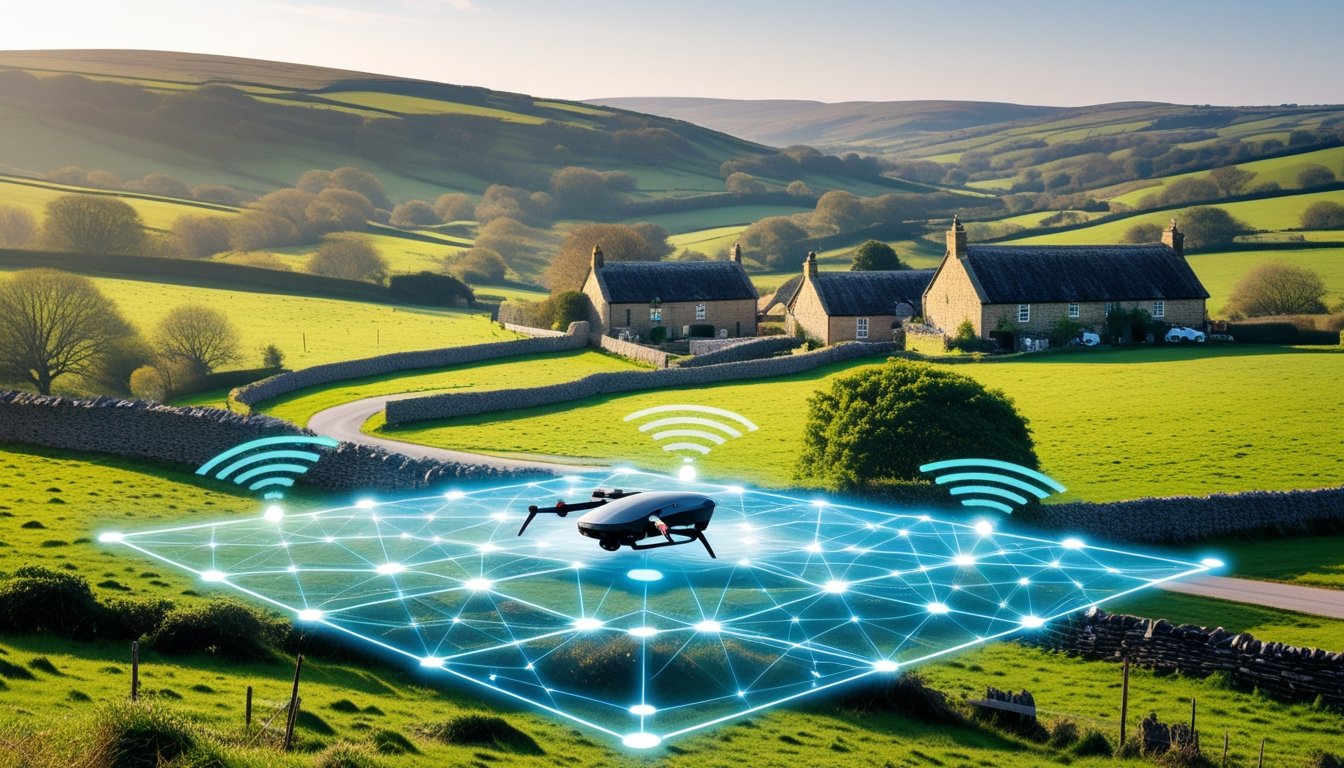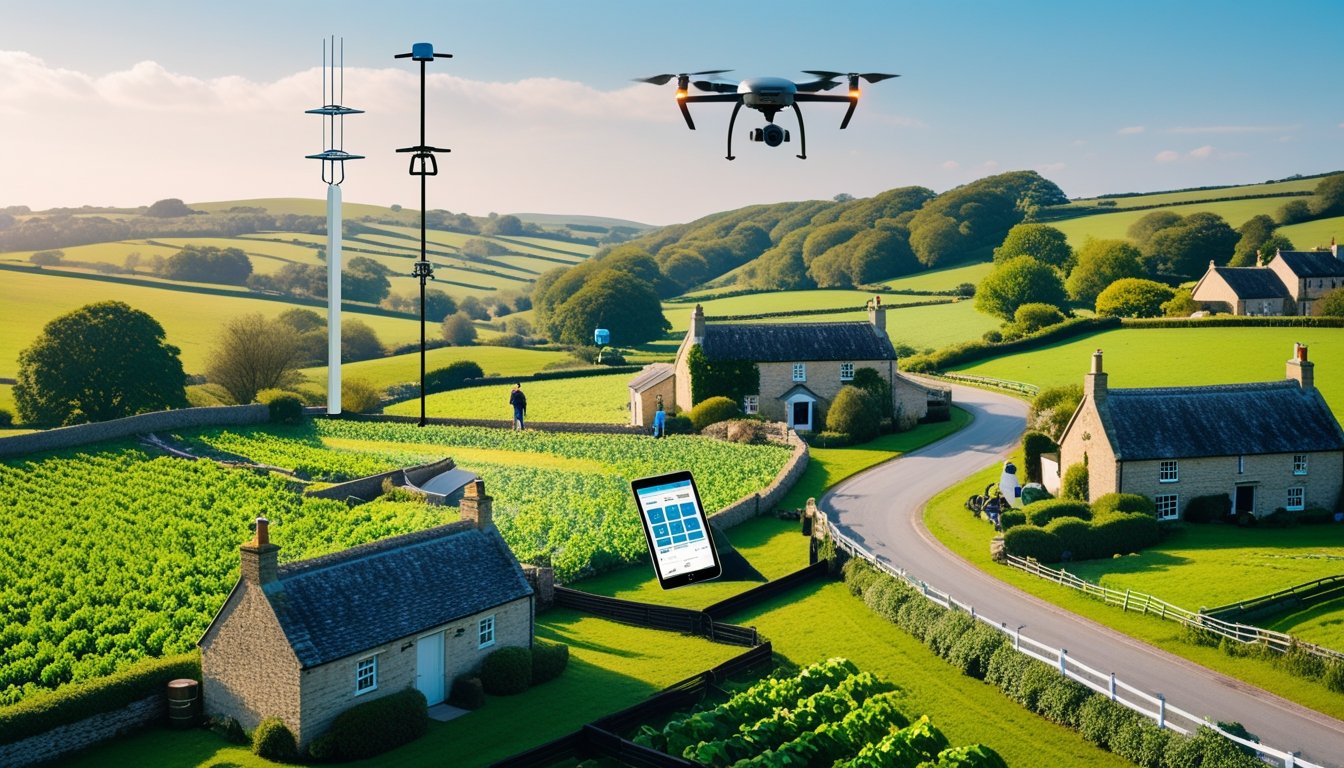Late updated: 01 Aug 2025 13:08
Written by: Oliver Bennett
AI Innovations in Enhancing UK Countryside Connectivity: Bridging Rural Digital Divides
Artificial Intelligence is no longer confined to urban areas and corporate environments. Its presence is growing in the UK countryside, providing a transformative impact by enhancing connectivity and bridging the digital divide. AI is revolutionising rural connectivity by enabling smart technologies like 5G networks and advanced transportation systems to make remote areas more accessible. This shift not only increases economic opportunities but also integrates rural communities into the wider technological ecosystem, allowing access to advanced healthcare and smarter agricultural practices.

Our exploration into AI innovations in the countryside reveals a fusion of tradition and technology that reshapes everyday life. Farms are now equipped with sensors and data analytics tools that optimise productivity and sustainability, setting a trend that could define the future of farming. These real-world applications of AI provide tangible benefits, turning what was once a digital desert into a fertile ground for innovation.
The ongoing digitalisation effort across UK infrastructure highlights another layer of transformation driven by AI. From enhancing broadband services to implementing AI in local governance, these changes promise a sustainable future. As we delve into these developments, it becomes clear that AI is not just an urban phenomenon but a nationwide catalyst for inclusivity and growth.
Key Takeaways
- AI boosts the connectivity of rural UK, narrowing the digital divide.
- Smart agriculture and transportation are transforming countryside life.
- Digitalisation driven by AI is fostering inclusivity and growth.
AI Innovations Transforming UK Countryside Connectivity

Artificial intelligence is playing a pivotal role in transforming the connectivity landscape in the UK's rural areas. By enhancing digital and network infrastructure, addressing the rural digital divide, and deploying intelligent broadband solutions, AI is reshaping how rural communities access and use digital services.
Optimising Digital and Network Infrastructure
AI technologies are revolutionising the network infrastructure in rural UK. Machine learning algorithms can predict network demand, optimising the distribution of resources. In rural settings, this predictive capability is invaluable for managing limited bandwidth effectively. 5G and VSAT installations benefit from AI by improving deployment strategies, focusing on areas with the greatest need.
Through the Shared Rural Network initiative, AI plays a crucial role in identifying coverage gaps. Data collected from mobile networks aids in real-time traffic management, reducing congestion and enhancing user experiences. AI-enhanced infrastructure not only increases efficiency but also accelerates the roll-out of cutting-edge connectivity technologies across the countryside.
Addressing the Rural Digital Divide
The rural digital divide has long been a concern for policy-makers. AI offers solutions by tailoring connectivity improvements to underserved communities. Machine learning models can pinpoint areas lacking adequate broadband access, allowing for targeted interventions. This ensures that rural populations have equal opportunities to engage with digital services.
Starlink installation represents a significant step forward, providing satellite-based internet coverage to remote locations. AI assists in identifying the optimum satellite linkages, thereby improving access and reliability. By integrating AI in these deployments, we bridge the urban-rural divide, creating a more inclusive digital landscape.
Intelligent Broadband and Network Deployment
AI drives intelligent broadband systems through data-driven insights. Analysing user data helps in understanding demand patterns, leading to better resource allocation. Broadband networks can be dynamically adjusted to improve performance and meet community needs more effectively.
Furthermore, AI facilitates swift, precise deployment strategies. Network performance can be evaluated and refined continuously, ensuring robust and resilient connectivity. By leveraging AI, rural areas in the UK can experience a transformation in broadband access, enhancing both economic and social opportunities.
Through these advancements, AI not only improves current infrastructure but also sets the stage for a digitally empowered countryside.
Real-World AI Applications for Rural Communities and Agriculture
Artificial Intelligence is changing how rural communities approach agriculture, healthcare, and economic growth. Emerging technologies like drones, IoT devices, and robotics facilitate smarter resource management and enhance connectivity.
Precision Farming and Smart Agriculture
Our approach to agriculture involves the use of AI technologies to improve precision farming. Precision farming uses sensors and data analytics to monitor field variability. For example, using drones to assess crop health allows us to make more informed decisions on irrigation and fertilisation.
We also integrate IoT devices into farm management for real-time monitoring. These devices track soil conditions, crop health, and weather patterns, enabling us to optimise resources efficiently. Smart agriculture enhances sustainability and boosts productivity, making it a cornerstone of modern farming.
AI-Driven Solutions in Rural Healthcare and Telemedicine
Telemedicine supported by AI-driven solutions offers immense benefits to rural healthcare. With the integration of natural language processing (NLP), patient-doctor interactions become more efficient, enabling faster diagnosis and treatment recommendations. AI also assists in managing patient data securely and effectively.
Remote areas face a shortage of healthcare professionals. Telemedicine reduces this gap by bringing expert medical advice via virtual consultations. We utilise AI applications to analyse medical images and monitor patients, ensuring timely interventions and improving healthcare outcomes in rural regions.
Role of IoT Devices, Drones, and Robotics
Drones play an increasingly vital role in enhancing connectivity and infrastructure in agriculture. They provide aerial views for surveillance, pest control, and crop assessment. Alongside drones, robotics automate tasks like planting and harvesting, reducing manual labour and human error.
We deploy IoT devices for seamless communication and data exchange in rural areas. By interlinking devices through networks, real-time updates and analytics are possible. This integration optimises processes, minimises waste, and maintains systems, ensuring smoother agricultural operations and better yield management.
Digital Transformation and Economic Growth in the Countryside
The digital transformation in the countryside is showing promising results in economic growth. We observe AI solutions enhancing broadband accessibility and supporting smart technologies. These advancements bridge the digital divide, allowing rural communities to access global markets and economic opportunities.
AI’s role in digital transformation fosters innovation and entrepreneurship. By empowering local businesses to take advantage of digital tools, rural areas can stimulate job creation. Innovative digital solutions help unlock new potential, driving productivity and supporting sustained economic development in countryside regions.
Frequently Asked Questions

Our use of AI in the UK countryside is transforming rural connectivity. By optimising network infrastructure and integrating smart technologies, AI is enabling better access to the internet and enhancing the capability of rural communities to utilise digital solutions effectively.
How are artificial intelligence technologies being used to improve internet access in rural areas of the UK?
AI technologies are playing a pivotal role in enhancing internet access in rural UK. They are used to optimise broadband infrastructure, identifying the most efficient pathways for data, thereby increasing internet speed and reliability. Moreover, AI assists in real-time monitoring and maintenance of networks, reducing downtime and ensuring continuity of connectivity.
What are the most recent advancements in AI that could boost connectivity in the British countryside?
Recent advancements in AI technologies include improved algorithms for network management and predictive analytics. These tools can foresee issues before they arise and allocate resources efficiently. Additionally, new AI-driven methods for deploying wireless networks have been introduced, which help bypass traditional infrastructure limitations in remote areas.
In what ways is AI contributing to the development of smart farming practices in the UK?
AI is revolutionising smart farming in the UK by enabling precision agriculture. Through data collection and analysis, AI systems provide farmers with insights on crop health, weather patterns, and soil conditions. These insights help in making informed decisions, improving yield and sustainability in farming practices.
Can AI be utilised to optimise the performance of existing rural network infrastructure in the UK?
AI contributes to optimising existing rural network infrastructure by enhancing monitoring processes and forecasting equipment failures. With AI-driven analytics, operators can maintain optimal network performance and prevent disruptions. AI's ability to adaptively manage network traffic ensures efficient use of available bandwidth, catering to the dynamic demands of rural users.
What role does artificial intelligence play in overcoming geographical challenges for internet connectivity in remote UK locations?
AI helps overcome geographical challenges by designing custom network solutions for remote UK locations. Machine learning models analyse topographical data to suggest optimal site placements for communication equipment. Additionally, AI-enabled drone technology can assist in deploying and maintaining connectivity equipment in hard-to-reach areas.
How might policymakers incorporate AI solutions to bridge the digital divide in the UK countryside?
Policymakers can bridge the digital divide by investing in AI-driven connectivity projects and fostering partnerships with technology providers. Encouraging the deployment of smart technologies and providing funding for AI research focused on rural applications can significantly enhance internet access. Furthermore, policy frameworks that support AI innovations in rural connectivity can drive equitable access and digital inclusivity.
